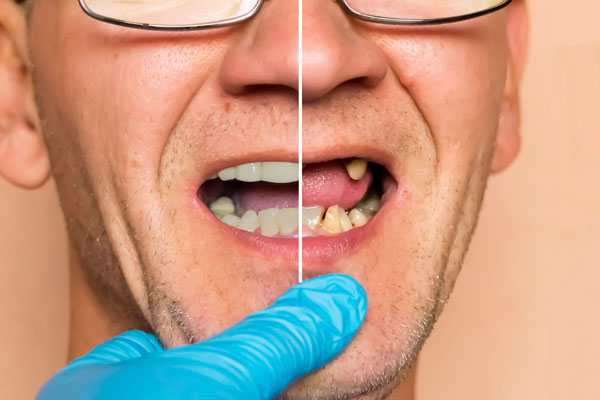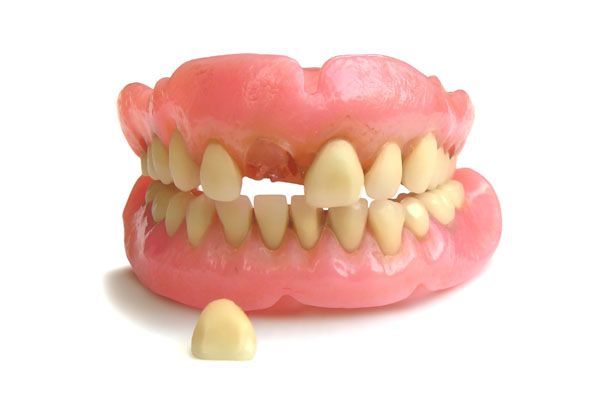Things You Should Know About Dentures Right Now

Dentures have changed quite drastically in the last several years. Modern dentures are sturdy, flexible and very natural looking. You most likely will not even be able to tell when someone is wearing them! Read on to learn all about dentures.
What are dentures?
Dentures are custom-made artificial teeth and gums that form to your mouth to replace lost or removed teeth. In most cases, dentures are removable. They are generally made of porcelain or hard resin and can be either complete dentures or partial dentures.
Complete dentures
Complete dentures are used when all the teeth are missing. They can be fit to both your top and bottom gum line. Some dentures use suction to stay in place, while others use an oral adhesive. A complete set of dentures is worn throughout the day but removed for cleaning and sleeping at night.
Partial dentures
This form of denture is often best when you are only missing a few teeth. A partial denture is a flexible plastic frame with one or more prosthetic teeth attached to it. Partial dentures can either be clipped on to your remaining natural teeth or cemented into place as a permanent bridge.
How to care for dentures
It is very important to care for dentures, but luckily the required care is quite simple. Rule number one is always to clean your dentures at least twice a day. Cleaning is done in a few steps:
- Brush: Carefully remove food residue, plaque and tartar by gently brushing with a denture brush or soft toothbrush and denture paste
- Soak: Allow your dentures to soak overnight in warm water and dissolvable denture cleaner
- Brush and rinse: After soaking throughout the night, you will want to brush again and rinse
Do not forget that your gums need care as well. Gently brush your gums with a very soft toothbrush or soft washcloth before inserting and after removing your dentures. There are a few things you will want to avoid to keep your dentures in great shape.
Foods to avoid
- Coffee and tea: Caffeine dehydrates you and can lead to dry mouth, which can cause your dentures to rub and irritate your gums
- Crunchy or sticky foods: Sticky foods, such as caramel or fruit chews, will almost always dislodge your dentures
- Crunchy foods, nuts and seeds: Small bits of popcorn, nuts or seeds can get lodged between your dentures and gums. This can lead to pain and irritation
- Hard-to-chew foods: Corn on the cob, whole apples or carrots can put too much pressure on the front of your dentures and lead to sore spots in your mouth
Products to avoid
- Regular toothpaste: Regular toothpaste is much too abrasive for dentures and can cause damage such as scratches or wearing down of material
- Bleaching products: Bleaching cream or rinse can weaken dentures and make them more susceptible to damage, as well as discolor in a way that looks less natural
Have questions?
If you still have questions about dentures or are not sure if dentures are right for you, call our office. We can work with you to find a denture option that suits your lifestyle.
Request an appointment here: http://thechesterfielddentist.com or call Chesterfield Dentist at (804) 412-0867 for an appointment in our Chester office.
Check out what others are saying about our denture care services on Yelp: Denture Care.
Recent Posts
A dentist’s job is to make sure your teeth stay in great health. For many patients, this means considering the benefits of dental restorations. Dentists recommend restorative procedures when a patient has a damaged, diseased, or missing tooth. These standard treatments stop the problem in its tracks, prevent additional injury and infection, and even provide…
The purpose of dental restorations is to replace permanent teeth that are lost. This can happen because of trauma to the tooth that renders it irreparable or decay that is so extensive that it requires extraction. There are several restoration options for replacing a missing tooth. Some are removable while others are permanently fixed in…
A healthy smile depends on more than daily brushing and flossing. If you are experiencing gum disease or severe plaque buildup, a deep teeth cleaning can restore your oral health. Unlike a standard dental cleaning, this treatment targets bacteria below the gumline and reduces the risk of serious oral health issues.Deep teeth cleaning, also known…
Multiple damaged or missing teeth can impair function and degrade the appearance of your smile. However, dental restorations can restore both the look and function of your teeth.There are many different types of dental restorations, and most of them can be used to address issues with multiple teeth. The type of restoration used for your…


